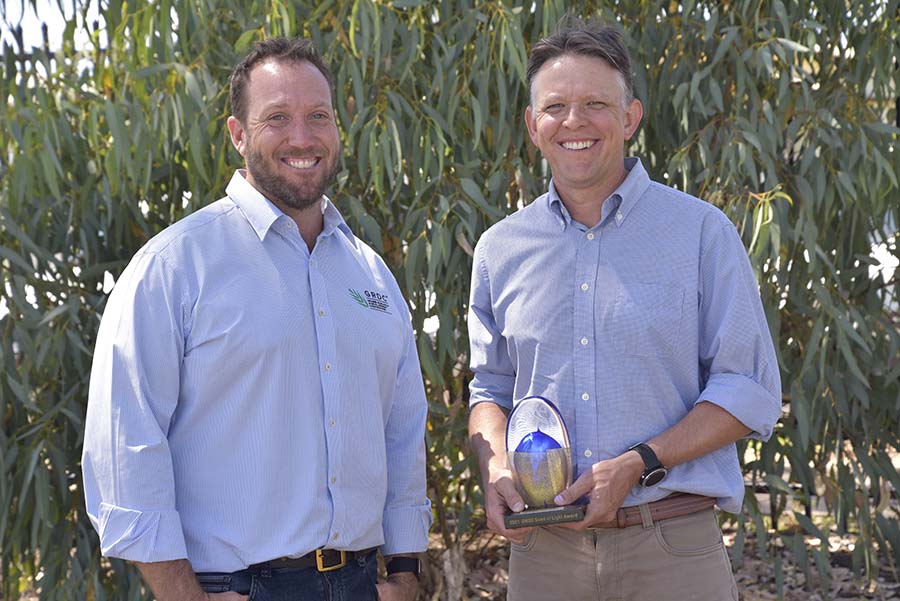Bringing a whole-of-farm approach to research is an ambitious goal, but it has been the cornerstone to CSIRO scientist Lindsay Bell’s ground-breaking work across Queensland and New South Wales for more than a decade.
While his research itself is complex and involves multiple disciplines, it is the principal farming systems scientist’s ability to communicate his findings in a straightforward and meaningful way to grain growers that sets him apart.
Dr Bell’s capacity for illuminating explanations that resonate with industry was recognised today when GRDC's Northern Region Panel presented him with the coveted 2021 GRDC Seed of Light Award.
Initiated in 1999, GRDC’s Seed of Light Award is presented annually to an individual who has made a significant contribution to communicating the importance and relevance of research outcomes to the wider grains industry.
GRDC Northern Region Panel vice-chair Arthur Gearon said Dr Bell’s farming system research took all the elements grain growers were dealing with seasonally – from economics, natural resource management, to crop rotations, agronomy, pests, weeds and diseases – to assess the impacts of different crop sequences on productivity and profitability.
“It’s complex research, but it is also ground-breaking work that is delivering invaluable management recommendations to growers with whole-of-farm considerations that will assist growers and agronomists to plan early and plan well,” Mr Gearon said.
“Yet the reality is it doesn’t matter how meaningful research is, unless it is communicated effectively to those who need it.
“The GRDC northern region panel have seen Lindsay develop and refine his skills as an accomplished communicator and in doing so successfully connect his research outcomes with growers and agronomists.”
Mr Gearon said the scientist’s capacity for wrangling data was also acknowledged as part of the GRDC Seed of Light Award.
“This northern farming systems research that Lindsay leads is one of the most involved projects GRDC invests in, with six regional sites stretching from Central Queensland to central west New South Wales, including a core site at Pampas on the Darling Downs,” he said.
“Each regional site is comparing five to eight system modifications as well as a baseline farming system, while the core site is comparing 38 different system treatments varying in crop intensity, crop choice and management so this equates to a huge amount of data.
“Understanding, analysing and developing meaningful key messages for industry is critical and that is another area in which Lindsay has excelled.”

GRDC Northern Region Panel vice-chair Arthur Gearon presenting Dr Linsday Bell the Seed of Light award. Photo: GRDC
Dr Bell accepted the award at GRDC's Grains Research Update at Dalby today (Tuesday, March 2).
Fittingly, the presentation was just down the road from the Chinchilla property where Dr Bell grew up and his interest in agriculture was born.
After high school, he completed a Bachelor of Agricultural Science (Honours), at the University of Queensland, Brisbane, before undertaking a PhD on pasture physiology and ecology at the University of Western Australia, Perth.
Dr Bell joined CSIRO in Perth in 2006 before moving to Toowoomba in 2007. His career with Australia’s national research agency has been lined by major awards, including the 2010 Young Agronomist of the Year awarded by the Australian Society of Agronomy, the 2011 CSIRO Divisional Team Award and CSIRO’s prestigious Julius Career Award in 2014.
Yet this ‘country bloke from the western downs’ remains determinedly down-to-earth.
Driven by a desire to help growers across all-scale farming systems, he has focused on improving the sustainability, productivity and resilience of farming enterprises through greater integration of crops and livestock and improved crop rotations.
His research has examined the management and benefits of dual-purpose crops, the use of short-term legume forages and other annual forages in crop rotations, and the development of simulation models for simulating pastures and crop grazing.
Dr Bell has also worked on and led research for development projects aimed at improving the livelihoods of small-holding crop-livestock farmers in north-west China, eastern Indonesia and Myanmar.
“I am extremely proud to receive this prestigious award from GRDC – it is certainly an honour to work in this industry with some fantastic people,” Dr Bell said.
“Agriculture is facing some big challenges into the future and we are going to need to take multi-disciplinary approaches and look for the big drivers of our systems if we are going to maintain productive and sustainable farming enterprises.
“It is a challenge to convey often complex and difficult science messages that growers can interpret for their farm and it is vital they have trusted, evidence-based science to make informed decisions for their business.
“I would like to thank my collaborators, colleagues and mentors who have been critical in helping me, without their support I would not be standing here today receiving this award.
“I would also like to thank my wife and family who keep life ticking along at home, and without whom it would be very difficult for me to travel around to present our research to growers and industry. “

























































